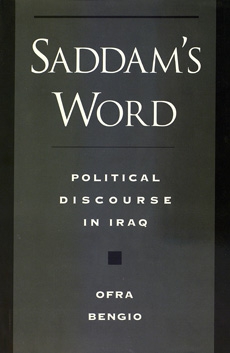| Éditeur : Oxford University Press | Date & Lieu : 1998-01-01, New York |
| Préface : | Pages : 268 |
| Traduction : | ISBN : 0-19-511439-6 |
| Langue : Anglais | Format : 155x235 mm |
| Code FIKP : Liv. En. 4713 | Thème : Politique |
|
Présentation
|
Table des Matières | Introduction | Identité | ||
 Saddam's Word: political discourse in Iraq This is the first serious attempt to understand modern Iraq through a close examination of the political discourse used by the Ba'th regime and its leader, Saddam Hussein. Drawing from newspaper articles and official publications, as well as Hussein's public statements, speeches, and writing, Saddam's Word demonstrates how the regime's propaganda defines the range of acceptable public discussion and manipulates history in an attempt to unify diverse and competing ethnic and religious groups.The revival and rewriting of Iraqi and Islamic myth, along with the construction of viable contemporary myths in today's language, are key instruments in the regime's credibility. Its 29-year hold on Iraqi power - unbroken through war, economic disaster, and ethnic strife - can be largely attributed to the subjugation of the media and public discourse to its own ends. By analyzing political terms, concepts, and idioms as disseminated through the official Iraqi mouthpieces, author Ofra Bengio illuminates Iraq's political culture and the events that these expressions have both reflected and shaped. Bengio succeeds not only in adding another dimension to our understanding of the "Saddam enigma" but also in illustrating the more universal truth that under any regime, political culture is built on the word. Saddam's Word will be of much interest to students and scholars of the contemporary Middle East, to observers of Saddam Hussein and his regime, and to those interested in how a regime maintains power by controlling public discourse. | |||||
| PREFACE Saddam's Word draws on a wide range of previously untapped Iraqi sources, notably party documents, pamphlets, newspapers, and books. Another important source is the Qur'an, to which the regime itself has made recourse, especially in its third decade in power. The method ap-plied in the study is interdisciplinary, combining research into the mean¬ing of language, political culture, myth-making, and symbolism while integrating them into the wider context of political and historical developments in Iraq. The book deals with the five most important overlapping spheres of Iraqi public life: the Ba'th and revolution; the political system and its leader Saddam Husayn; nation-building and ethnic minorities; enemies and wars; and history and Islam. Analyzing these themes through the prism of Iraq's political discourse, the book demonstrates how Saddam Husayn and his regime sought to manipulate language, tradition, and Islam in order to shape Iraqis' minds, mobilize them for his own political purposes, and portray a picture of virtual reality that was a far cry from the genuine one. Finally, the study shows how the regime itself became entrapped by its own totalitarian discourse, which did not allow feedback from the people. Though a unique case, Ba'thi Iraq can nevertheless be taken as a case study for understanding other totalitarian regimes not only in the Middle East but also in the world at large. Moreover, in addition to expanding our knowledge of the modern Middle East, it demonstrates how the study of culture and semiotics can contribute to our understanding of politics and history. My home has been all that a woman could desire when working on such an endeavor. My husband Shmuel and my sons Lavi and Adi have been my greatest source of inspiration and support. In fact, they are the principle reason and motivation for my writing this book. Tel Aviv - Israel | ||||